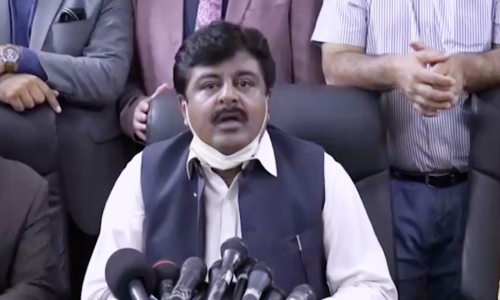KARACHI: Chief Minister Syed Murad Ali Shah has said under the 18th Amendment the formation of curriculum is a provincial subject but the federal government wants to impose it unilaterally.
“That’s why my government declined to adopt it,” he said while referring to the federal government’s Single National Curriculum plan.
He was talking to a 29-member delegation of the Punjab Assembly comprising 18 MPAs of the Pakistan Tehreek-i-Insaf, six of Pakistan Muslim League-N and four of Pakistan Peoples Party here at the CM House.
To a question, the chief minister said that a majority of students in Sindh were receiving education in Sindhi medium.
Tells a visiting Punjab Assembly delegation that Karachi’s population was not fairly counted in 2017 census
“Education in mother tongue is considered to be the most effective tool of teaching, therefore, our preference is to make curriculum accordingly,” he said and added his government had already worked hard on overhauling the curriculum.
The CM said that the federal government was trying to impose its curriculum unilaterally and the provincial government had already framed its own curriculum and would be improving it further with the passage of time.
Donors agree to finance desalination plants
To another question, Mr Shah said that in the last census held in 2017 the population of Karachi was shown at 16 million, which was wrong. Therefore, he said, he had been fighting the case of the metropolis so that its original population could be counted to get its due share in the national resources.
Replying to a question, Mr Shah said that water shortage in the city was a genuine issue.
“Karachi gets water from two sources — the Indus and the Hub dam. Our rivers were facing water shortage so reliance on the Indus has become unreliable and Hub dam has a limited source of water. We have decided to tap seawater source by installing desalination plants,” he said.
He added that the donor agencies had agreed to finance the projects.
Talking about state of peace, Mr Shah said that Karachi stood at number six on the list of most dangerous cities when the Pakistan Peoples Party came into power. A vigorous clean-up operation was launched and the writ of the state was established and now the same city of Karachi is at 136th in the crime index of the world, he added.
“We restored peace in the city first and then started reconstruction of dilapidated infrastructure,” Mr Shah said, adding: “We have reconstructed and widened Sharea Faisal and Tariq Road for the first time after the tenure of Shaheed Zulfikar Ali Bhutto. We have constructed a number of other roads, flyovers and underpasses and still have to do a lot of work,” he said.
Free heart, cancer treatment
Mr Shah told the lawmakers that his government had made the National Institute of Cardiovascular Diseases (NICVD), National Institute of Child Health (NICH) and Jinnah Postgraduate Medical Centre (JPMC) as the “best” health facilities.
“Our NICVD and JPMC’s CyberKnife hospitals are providing free-of-cost best services. The NICVD is the only hospital in the region which performs angiographies, angioplasties and bypasses free of cost and CyberKnife providing treatment of cancer free of cost,” he said.
The chief minister invited the delegation to visit Thar and get a personal experience to witness the work done by the Sindh government.
“Now, Thar has become a power producing [area] of the country and its credit goes to Shaheed Benazir Bhutto, who had initiated coal mining and coal-fired power projects which could not take place in those days, but initial work was done,” he said.
Mr Shah appreciated the MPAs of Punjab and said that such visits would help to develop political coordination and strengthen democracy.
Published in Dawn, September 23rd, 2021















































